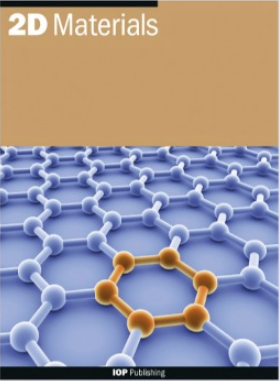Polarization-tuneable excitonic spectral features in the optoelectronic response of atomically thin ReS2.
IF 4.3
3区 材料科学
Q2 MATERIALS SCIENCE, MULTIDISCIPLINARY
引用次数: 0
Abstract
Abstract The low crystal symmetry of rhenium disulphide (ReS 2 ) leads to the emergence of dichroic optical and optoelectronic response, absent in other layered transition metal dichalcogenides, which could be exploited for device applications requiring polarization resolution. To date, spectroscopy studies on the optical response of ReS 2 have relied almost exclusively in characterization techniques involving optical detection, such as photoluminescence, absorbance, or reflectance spectroscopy. However, to realize the full potential of this material, it is necessary to develop knowledge on its optoelectronic response with spectral resolution. In this work, we study the polarization-dependent photocurrent spectra of few-layer ReS 2 photodetectors, both in room conditions and at cryogenic temperature. Our spectral measurements reveal two main exciton lines at energies matching those reported for optical spectroscopy measurements, as well as their excited states. Moreover, we also observe an additional exciton-like spectral feature with a photoresponse intensity comparable to the two main exciton lines. We attribute this feature, not observed in earlier photoluminescence measurements, to a non-radiative exciton transition. The intensities of the three main exciton features, as well as their excited states, modulate with linear polarization of light, each one acquiring maximal strength at a different polarization angle. We have performed first-principles exciton calculations employing the Bethe-Salpeter formalism, which corroborate our experimental findings. Our results bring new perspectives for the development of ReS 2 -based nanodevices.原子薄ReS2光电响应中的偏振可调谐激子光谱特征。
摘要:二硫化铼(res2)的低晶体对称性导致了其他层状过渡金属二硫化物所没有的二向色光学和光电子响应的出现,这可以用于需要偏振分辨率的器件应用。迄今为止,对res2光学响应的光谱学研究几乎完全依赖于涉及光学检测的表征技术,如光致发光、吸光度或反射光谱。然而,为了充分发挥这种材料的潜力,有必要开发其光谱分辨率的光电响应知识。在这项工作中,我们研究了在室温和低温条件下的低层ReS 2光电探测器的极化依赖光电流谱。我们的光谱测量揭示了两条主要的激子线,其能量与光学光谱测量结果相匹配,以及它们的激发态。此外,我们还观察到另一个类似激子的光谱特征,其光响应强度与两个主要激子线相当。我们将这一特征归因于非辐射激子跃迁,而不是在早期的光致发光测量中观察到的。三种主要激子特征及其激发态的强度随光的线偏振调制,每种激子在不同的偏振角处获得最大强度。我们已经用贝特-萨尔皮特形式进行了第一性原理激子计算,这证实了我们的实验发现。我们的研究结果为基于re2的纳米器件的发展带来了新的前景。
本文章由计算机程序翻译,如有差异,请以英文原文为准。
求助全文
约1分钟内获得全文
求助全文
来源期刊

2D Materials
MATERIALS SCIENCE, MULTIDISCIPLINARY-
CiteScore
10.70
自引率
5.50%
发文量
138
审稿时长
1.5 months
期刊介绍:
2D Materials is a multidisciplinary, electronic-only journal devoted to publishing fundamental and applied research of the highest quality and impact covering all aspects of graphene and related two-dimensional materials.
 求助内容:
求助内容: 应助结果提醒方式:
应助结果提醒方式:


